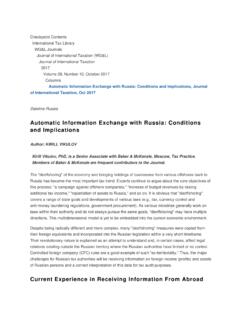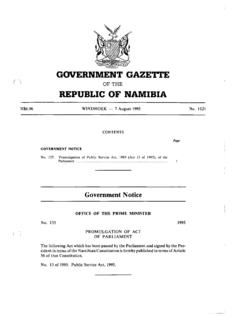Transcription of DUTIES AND LIABILITIES OF DIRECTORS OF AUSTRALIAN …
1 International Guide to Regulatory Fintech Sandboxes | 10 DUTIES AND LIABILITIES OF DIRECTORS OF AUSTRALIAN COMPANIES2020 IntroductionAustralian law imposes numerous DUTIES and obligations upon various people who are employed by, or who act on behalf of, an AUSTRALIAN company. The particular DUTIES depend upon the role of the person within the company. This Guide outlines the DUTIES of DIRECTORS of an AUSTRALIAN covered in this Guide include common law and statutory DUTIES , delegation, reliance on others, insider trading, disclosure requirements and DIRECTORS insurance and indemnities. A Glossary of key terms is included at the end of the a trusted adviser to many of the top companies in Australia, Baker McKenzie is recognised for its extensive experience advising DIRECTORS of AUSTRALIAN hope that this Guide provides you with a broad overview of the DUTIES of DIRECTORS of AUSTRALIAN companies.
2 It is not intended, however, to be an exhaustive analysis of all relevant legal requirements. If you are uncertain about any of the issues raised in this Guide or require further details or assistance, please do not hesitate to contact Mendes+ 61 2 8922 De Young+61 3 9617 Castiglia+61 2 8922 Rumboll+61 2 8922 Ickeringill+61 3 9617 Fuggle+61 2 8922 Sacks+61 2 8922 Kennedy+61 3 9617 Glanz+61 2 8922 Sanderson+61 2 8922 Lustig+61 3 9617 Jefferson+61 2 8922 Troiano+61 3 9617 Lou+61 2 8922 Apos+61 3 9617 McGrath+61 2 8922 Lewis Apostolou+61 3 9617 Peterson+61 7 3069 McLaughlin+61 2 8922 Chin+61 3 9617 Pocock+61 7 3069 as a director .. ' DUTIES .. and reliance on benefits .. trading .. reporting .. disclosure obligations .. assistance for share acquisitions .. of DIRECTORS ' bonuses .. change risk.
3 ' insurance and sources of liability .. Guide is current as at 1 September 2020 unless indicated otherwise. All dollar amounts stated in this Guide are AUSTRALIAN dollars. 2020 Baker & McKenzie. All rights communication has been prepared for the general information of clients and/or professional associates of Baker & McKenzie. You should not rely on the contents. It is not legal advice and should not be regarded as a substitute for legal advice. To the fullest extent allowed by law, Baker & McKenzie excludes all liability (whether arising in contract, for negligence or otherwise) in respect of all and each part of this Guide, including without limitation, any errors or omissions. Baker & McKenzie, an AUSTRALIAN Partnership, is a member firm of Baker & McKenzie International, a global law firm with member law firms around the world.
4 In accordance with the common terminology used in professional service organisations, reference to a "partner" means a person who is a partner, or equivalent, in such a law firm. Similarly, reference to an "office" means an office of any such law firm. This may qualify as "Attorney Advertising" requiring notice in some jurisdictions. Prior results do not guarantee similar Baker McKenzie AustraliaBaker McKenzie is unique among AUSTRALIAN law firms in our ability to deliver the knowledge, experience and capabilities of our global network to our clients in the local market. Companies benchmark themselves against the best practice in their sectors, globally, not just domestically. We provide our clients with the innovative legal solutions they expect from the global top-tier law firm, together with commercial pragmatism and seasoned experience as leaders in Australia.
5 Baker McKenzie has been an integral part of the AUSTRALIAN legal landscape since | Baker McKenzie1. Position as a of directorsA public company must have at least three DIRECTORS . At least two DIRECTORS of a public company must ordinarily reside in proprietary company must have at least one director. At least one director of a proprietary company must ordinarily reside in an individual ( a natural person) who is at least 18 years of age may be appointed as a director. A person must give written consent to act as a director of a company before being may be appointed by the members of the company in a general meeting or by the other DIRECTORS in a board meeting. DIRECTORS leave office if they resign, retire, are removed in accordance with the Corporations Act and/or the company's constitution, or are disqualified from managing personal details of a director, such as their full name, date and place of birth and usual residential address, must be notified to ASIC shortly after the director is appointed.
6 These details then become publicly directorsA director may generally appoint an alternate to exercise some or all of the director's powers for a specified period (for example, to attend and vote at board meetings when the director is unable to attend). The method of appointment and powers of alternate DIRECTORS are usually set out in the constitution of the company. A person acting as an alternate director is subject to the same DUTIES and LIABILITIES as other of the board of directorsThe board's functions depend on the circumstances of the company and may include to: appoint and reward the company's chief executive; set goals, formulate strategies and approve business plans for the company; approve annual budgets and key management decisions (such as decisions on major capital expenditure, business acquisitions, restructuring and refinancing); monitor management performance and business results; set and review policies for member communication and provide reports to members.
7 And set and review budgetary control and conformance the DIRECTORS of a company act collectively as a board, each director is individually subject to statutory and common law DUTIES , including to act in good faith in the best interests of the company and with reasonable care and If a proprietary company wishes to raise capital through equity crowd-sourced funding (CFS), it will be subject to Australia's CFS regime which requires, amongst other things, that the company have at least two DIRECTORS . If the company has two DIRECTORS , one of the DIRECTORS must be ordinarily resident in Australia. If the company has more than two DIRECTORS , a majority of the DIRECTORS must be ordinarily resident in | Baker constitutionA company's internal management may be governed by the replaceable rules in the Corporations Act, by a constitution or by a combination of is common for a company to have a constitution.
8 The constitution sets out rules by which the company is governed and regulates the relationships between the company, its officers and members. The constitution may include, amend or displace the replaceable rules in the Corporations constitution typically includes provisions regarding: the share capital of the company, including procedures for issuing and transferring shares in the company; powers, rights and DUTIES of members; appointment of officers and their powers; and the winding up of the company's constitution (if any) and any replaceable rules that apply to the company operate as a statutory contract that is binding on the company, each member and each director and of individual directorsOn a board of DIRECTORS , individual DIRECTORS may have distinct responsibilities to the company, depending on the nature of their particular role within the and non-executive directorsIf there are executive and non-executive DIRECTORS on a board, the executive DIRECTORS will usually have greater responsibilities than the non-executive DIRECTORS .
9 The distinction between executive and non-executive responsibilities is reflected in the different standards of care applied to individual DIRECTORS - a higher standard of care will apply to executive DIRECTORS (see section below).Managing directorsThe board of DIRECTORS can also choose to appoint a managing director to assume responsibility for the day-to-day management of the company. Where an individual director on a board would not have the ostensible authority to act alone on behalf of the company, a managing director may be empowered to act in a way akin to the board acting as a DIRECTORS ' the DUTIES are owed toDirectors must act for the benefit of "the company as a whole". In general, this means that DIRECTORS must act in the interests of all members collectively. However, DIRECTORS may sometimes be required or permitted to take other interests into Currently, the extent to which DIRECTORS owe a fiduciary duty to consider the interests of stakeholders other than members as a whole (such as individual members, creditors and employees), may be affected by the impact of COVID-19 on the company.
10 DIRECTORS are required to be proactive in understanding the risks and opportunities that the current economic situation presents to their company, particularly if the company is in financial distress. In relation to the impact of COVID-19 on DIRECTORS ' DUTIES , ASIC Commissioner John Price has stated that ".. DIRECTORS and officers will need to carefully reflect on their fundamental DUTIES to act with due care, skill and diligence and to act in the best interests of the company. This will include reflection on which stakeholders interests need to be factored into decisions including employees, investors and creditors ." (see further: ASIC: DIRECTORS DUTIES in context of COVID-19). 3 | Baker McKenzieIndividual membersIn general, DIRECTORS do not owe DUTIES directly to individual members. However, in specific circumstances, a director may be found to owe a duty to an individual member.











